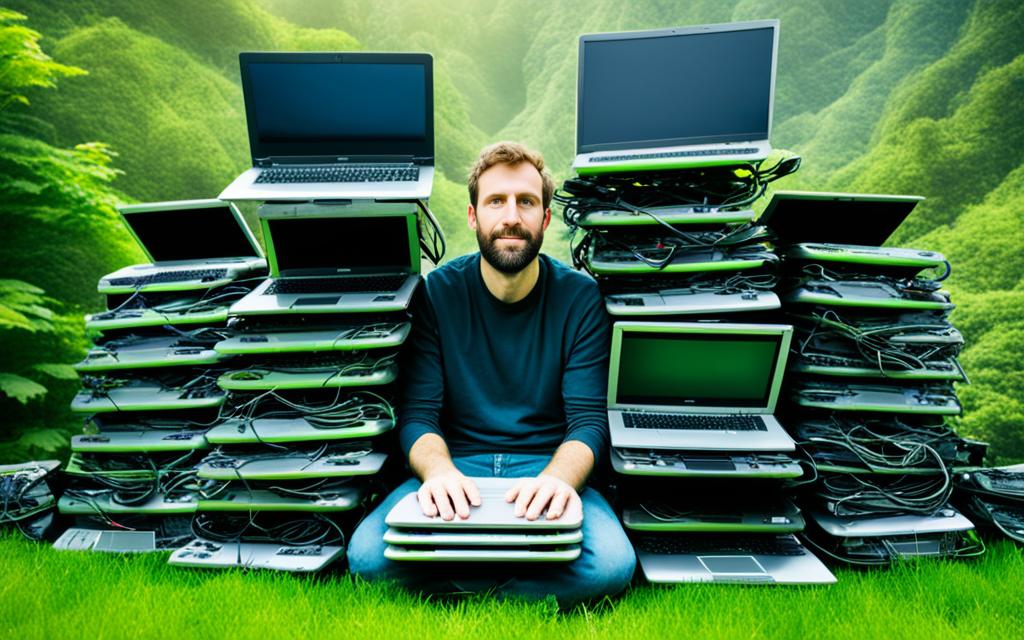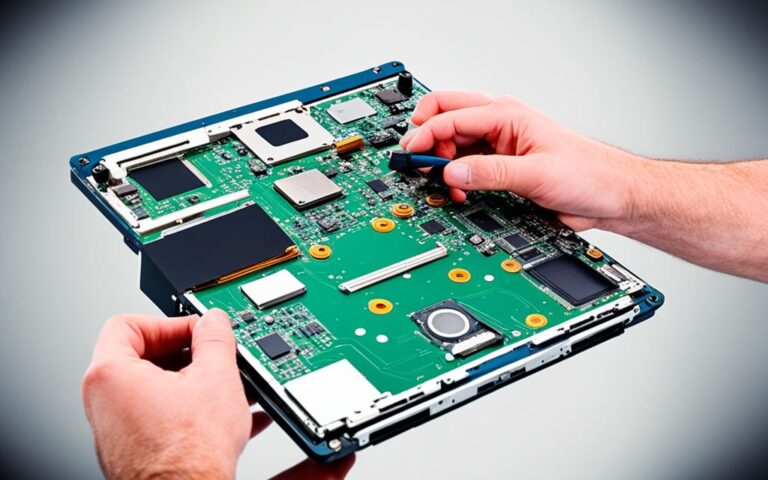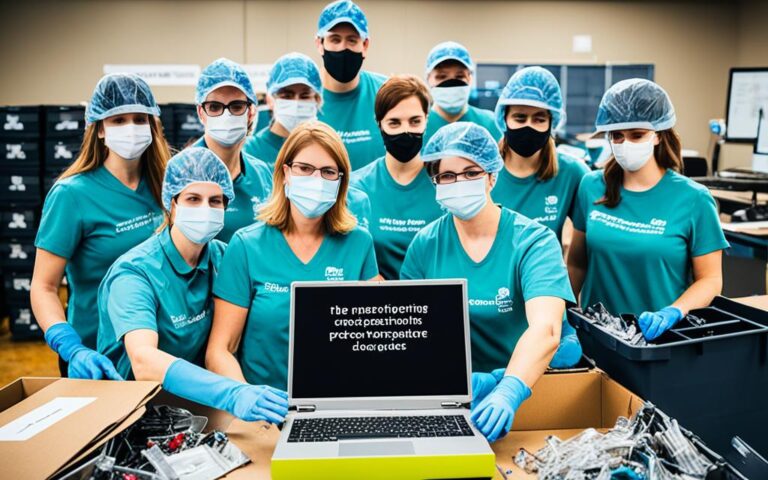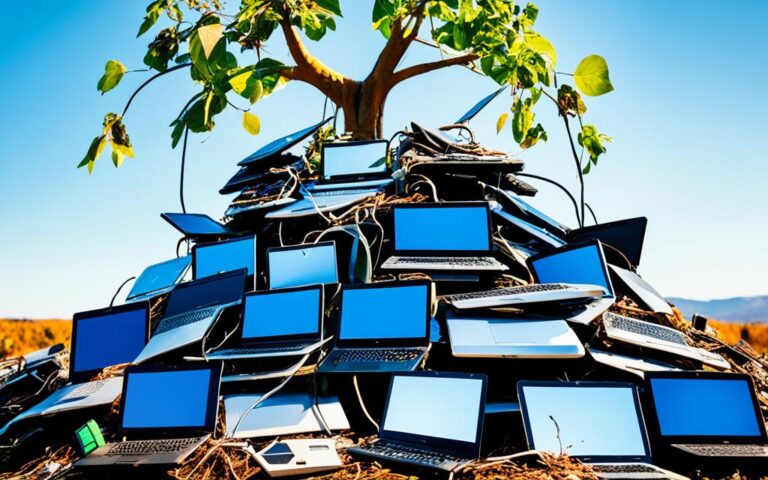Navigating the World of Laptop Recycling: A Consumer’s Guide
Welcome to our comprehensive consumer guide on laptop recycling and responsible disposal. In this guide, we will explore the importance of recycling electronic devices, particularly laptops, and provide you with valuable information to help you navigate through the world of laptop recycling.
Electronic devices have become an integral part of our daily lives, but their disposal can often pose challenges. With the constant advancement of technology, laptops are regularly being replaced and discarded, contributing to the growing problem of electronic waste, also known as e-waste.
E-waste contains hazardous materials such as lead, mercury, and cadmium, which can be harmful to the environment and human health if not disposed of properly. Unfortunately, lack of awareness and accessible recycling options have led to improper disposal practices.
Addressing this issue requires a collective effort from consumers, manufacturers, and recycling organizations. By educating ourselves about responsible disposal methods, advocating for extended producer responsibility, supporting e-waste collection centers, and promoting safe recycling practices, we can make a significant impact on reducing the environmental and health risks associated with e-waste.
In the following sections, we will delve deeper into the problem of e-waste, uncover the ripple effects of unchecked disposal, explore the solutions available, and conclude with the importance of responsible laptop recycling. Together, let’s play our part in protecting the environment and ensuring a sustainable future for generations to come.
The Problem of E-Waste
The proliferation of electronic devices has led to a surge in e-waste generation. Discarded electronics often contain hazardous materials such as lead, mercury, and cadmium, posing threats to the environment and human health. Improper disposal, lack of awareness, and convenient recycling options contribute to the problem.
E-waste, also known as electronic waste, refers to discarded electronic devices. As technology advances, consumers frequently upgrade their gadgets, leading to a rapid increase in e-waste. The improper handling and disposal of such waste pose significant environmental and health risks.
Electronic devices, ranging from smartphones and laptops to televisions and refrigerators, often contain hazardous materials. These substances can include heavy metals like lead, mercury, and cadmium, as well as toxic chemicals like brominated flame retardants. If e-waste is not properly managed, these hazardous materials can contaminate soil, water, and air, leading to pollution and potentially harmful effects on human health.
“Improper disposal, lack of awareness, and convenient recycling options contribute to the problem.” – John Sawyer, Environmental Scientist
One of the main challenges in tackling the e-waste problem is the lack of awareness and understanding among consumers. Many people do not realize that their old electronic devices should not be discarded with regular household waste. Instead, they require separate recycling methods to ensure the safe extraction and disposal of hazardous materials.
The convenience of regular waste disposal systems also contributes to improper e-waste management. People often opt for the easiest disposal option available, which may not have appropriate mechanisms in place for handling electronic devices. As a result, valuable resources within these devices go to waste, and hazardous materials end up polluting the environment.
Safe and responsible ways of managing e-waste involve proper recycling processes. Recycling e-waste allows for the recovery of valuable metals and components while ensuring the appropriate handling of hazardous materials. Unfortunately, the lack of accessible recycling options often hinders these efforts.
Addressing the problem of e-waste requires a multifaceted approach. It is essential to raise awareness among consumers about the hazards of improper disposal and the benefits of responsible recycling. Additionally, extended producer responsibility plays a crucial role in ensuring that manufacturers are accountable for the end-of-life management of their products.
E-waste collection centers offer a convenient solution for individuals looking to dispose of their electronic devices responsibly. These centers provide specific drop-off points where e-waste can be collected, sorted, and directed towards appropriate recycling facilities.
By implementing safe recycling practices and promoting consumer education, the problem of e-waste can be mitigated. It is crucial for individuals to understand the environmental and health implications of improper e-waste disposal and take proactive steps towards responsible recycling.
The Ripple Effects
Unchecked e-waste disposal has far-reaching consequences that contribute to environmental pollution, the waste of valuable resources, and perpetuate environmentally damaging mining activities. The consequences of not recycling e-waste extend beyond immediate environmental concerns.
The Environmental Pollution
Improper e-waste disposal leads to environmental pollution in various ways. Electronic devices contain hazardous materials such as lead, mercury, and cadmium that can seep into soil and water sources if not properly managed. These toxic substances pose a significant threat to ecosystems, wildlife, and human health. Additionally, the improper incineration of e-waste releases harmful pollutants into the atmosphere, contributing to air pollution and climate change.
The Waste of Valuable Resources
Many electronic devices contain valuable metals like gold, silver, and palladium, which can be recovered through proper recycling processes. However, when e-waste is not recycled, these valuable resources go to waste. According to a report by the United Nations University, approximately 7% of the world’s gold supply is found in electronic waste. By not recycling e-waste, we miss out on the opportunity to conserve these valuable resources and reduce the need for environmentally destructive mining activities.
“By not recycling e-waste, we miss out on the opportunity to conserve valuable resources and reduce the need for environmentally destructive mining activities.”
The Environmental Damaging Mining Activities
When e-waste is not properly recycled, the demand for raw materials to manufacture new electronic devices increases. This demand drives environmentally damaging mining activities, including open-pit mining and deforestation, which disrupt ecosystems, destroy habitats, and pollute surrounding areas. By recycling e-waste and recovering valuable metals, we can reduce the need for new and environmentally destructive mining operations.
To illustrate the impact of valuable metals found in e-waste, here is a summary table:
| Valuable Metal | Estimated Amount Recovered from E-Waste |
|---|---|
| Gold | 300 tons per year |
| Silver | 7,500 tons per year |
| Palladium | 8 tons per year |
By responsibly recycling e-waste and recovering these valuable metals, we can reduce the environmental impact of mining activities and promote a more sustainable use of resources.
As we can see, the consequences of not recycling e-waste are significant, ranging from environmental pollution to the waste of valuable resources and the perpetuation of environmentally damaging mining activities. It is crucial for individuals, businesses, and governments to prioritize responsible disposal and recycling to mitigate these ripple effects and work towards a more sustainable future.
The Solution: Responsible Disposal and Recycling
Responsible disposal and recycling practices are crucial in addressing the e-waste problem. By adopting these practices, we can mitigate the environmental and health risks associated with improper e-waste disposal. Here are key components of the solution:
Consumer Education
Consumer education plays a vital role in raising awareness about the impact of e-waste and encouraging responsible disposal. By educating consumers about the importance of recycling electronic devices and the hazards of improper disposal, we can empower them to make informed choices for a sustainable future.
Extended Producer Responsibility
Extended producer responsibility (EPR) is a principle that ensures manufacturers take responsibility for the entire life cycle of their products, including proper end-of-life management. By holding manufacturers accountable for their products’ disposal, EPR incentivizes the development of sustainable production processes and discourages the production of devices with limited recyclability.
E-Waste Collection Centers
E-waste collection centers provide convenient and accessible drop-off points for consumers to dispose of their electronic devices in an environmentally responsible manner. These centers employ safe recycling practices and ensure that hazardous materials are handled properly, preventing their release into the environment. By utilizing e-waste collection centers, consumers can contribute to the reduction of e-waste and promote the conservation of valuable resources.
Safe Recycling Practices
Safe recycling practices are essential to ensure that hazardous materials present in electronic devices are handled responsibly. Advanced recycling technologies and processes are employed to recover valuable metals and components from e-waste while minimizing environmental impact. By supporting safe recycling practices, consumers can actively contribute to the sustainable management of e-waste.
To visualize the impact of responsible disposal and recycling, let’s take a look at the following table:
| Benefit | Description |
|---|---|
| Reduction of environmental pollution | Proper disposal and recycling of e-waste prevent harmful materials from seeping into the soil and water, minimizing environmental pollution. |
| Conservation of valuable resources | Recycling electronic devices allows for the recovery of valuable metals like gold and palladium, reducing the need for environmentally damaging mining activities. |
| Promotion of a circular economy | Responsible disposal and recycling contribute to the development of a circular economy by reintroducing recycled materials back into the production process, reducing the need for raw materials. |
By embracing responsible disposal and recycling practices, we can collectively combat the e-waste problem, protect the environment, and create a more sustainable future for generations to come.
Conclusion
Responsible laptop recycling is crucial in addressing the environmental impact and health concerns associated with e-waste. The proliferation of electronic devices has resulted in a growing problem of hazardous materials being improperly disposed of. By raising awareness about the importance of responsible disposal, advocating for proper regulations, and supporting recycling initiatives, consumers can play a significant role in mitigating the detrimental effects of e-waste on our planet.
Proper laptop recycling not only helps protect the environment but also prevents potential health hazards. Electronic devices often contain hazardous materials like lead, mercury, and cadmium, which can leach into the soil and water if not disposed of correctly. By responsibly recycling your laptop, you contribute to reducing the risks posed to both the environment and human health.
Remember, before recycling your laptop, take steps to securely dispose of any personal data to protect your privacy. By doing so, you ensure that your laptop is not only recycled responsibly but that your personal information remains secure. Together, implementing responsible laptop recycling practices can contribute to a future where electronic devices drive progress without causing significant environmental degradation or health issues.
FAQ
What is e-waste?
E-waste refers to discarded electronic devices that contain hazardous materials and pose environmental and health risks if not disposed of properly.
Why is e-waste a problem?
E-waste is a problem because it contributes to environmental pollution and the waste of valuable resources. Discarded electronics often contain hazardous materials such as lead, mercury, and cadmium, which can harm the environment and human health if not handled responsibly.
What can I do to responsibly dispose of my electronic devices?
To responsibly dispose of your electronic devices, you can educate yourself about proper recycling practices, ensure that manufacturers take responsibility for the end-of-life management of their products, utilize e-waste collection centers for convenient drop-off, and follow safe recycling practices.
Why is consumer education important in addressing the e-waste problem?
Consumer education is crucial because it raises awareness about the importance of responsible disposal and recycling of electronic devices. Educated consumers can make informed choices and contribute to reducing e-waste generation.
What is extended producer responsibility?
Extended producer responsibility ensures that manufacturers are accountable for the end-of-life management of their products. This includes taking responsibility for the proper disposal and recycling of electronic devices once they reach the end of their usable life.
Where can I find e-waste collection centers?
E-waste collection centers are typically located in local communities and provide convenient drop-off points for consumers to safely dispose of their electronic devices. You can check with your local recycling facilities or search online for nearby e-waste collection centers.
Why are safe recycling practices important?
Safe recycling practices ensure that hazardous materials present in electronic devices are handled responsibly and do not cause harm to the environment or human health. By following safe recycling practices, you can ensure that e-waste is properly dismantled, recycled, and the valuable resources contained in the devices are recovered.
How does laptop recycling contribute to addressing environmental impact and health concerns?
Responsible laptop recycling plays a crucial role in addressing environmental impact and health concerns associated with e-waste. By securely disposing of personal data and recycling laptops through proper channels, consumers can contribute to a future where electronic devices are recycled, valuable resources are recovered, and environmental degradation is minimized.















